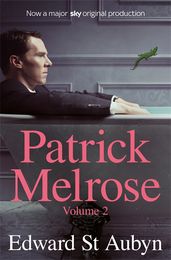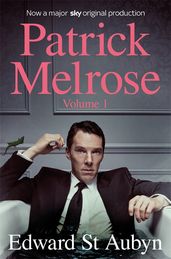Alex Clark on the magic of Patrick Melrose
Literary journalist Alex Clark reflects on what it is that makes Edward St Aubyn's series so remarkable.

The Emmy award-winning, BAFTA-nominated series Patrick Melrose, starring Benedict Cumberbatch, was based on the series of semi-autobiographical novels by Edward St Aubyn. Here Alex Clark, literary journalist and editor, reflects on what it is that makes the books so remarkable.
Toffs behaving beyond badly to one another and themselves, squandering fortunes and kindness and love in increasingly vain attempts to satisfy their unquenchable appetites; brittle, spite-fuelled conversation; beautiful settings made ugly by narcissism and bile.
It sounds appalling: the worst excesses of Bullingdon Club Britain set down on paper. Instead, Edward St Aubyn’s five Patrick Melrose novels constitute one of the most gripping and profound works of fiction of the last quarter of a century. And as Patrick, embodied by Benedict Cumberbatch, comes to our television screens, this is an apposite moment to explore what makes these books so special.
The novels – Never Mind, Bad News, Some Hope, Mother’s Milk and At Last – were written between 1992 and 2011, falling roughly into two groups. The first three appeared in the early 1990s, and it wasn’t until well into the new millennium that St Aubyn took up Patrick Melrose’s story once again; in fact, at first, he thought Mother’s Milk was an entirely unrelated novel. But the character he has called his alter ego simply wouldn’t stay quiet.
It’s easy to see why. From our first encounter with five-year-old Patrick through to the moment we accompany him, now in middle age, to his mother’s funeral, he is an utterly compelling presence on the page. Hyper-observant and articulate, prone to creating vivid tableaux and character vignettes, Patrick takes in all the shifts and undercurrents that surround him – even when he is too young to understand their meaning.
But what he does understand, from early on, is fear. His life is one of extreme privilege and extreme brutality: in Never Mind, we meet him, swishing his sword and thinking fondly of Ivanhoe, shortly before his father, David, beats and rapes him. “Back down again,” we discover, “Patrick felt utter defeat. There was no flash of purple cloaks. No special soldiers. No gecko. Nothing. He tried to take to the air again, the way seabirds do when a wave breaks over the rock where they were standing. But he had lost the power to move and stayed behind, drowning.”
Defeated, paralysed, drowning: these terrifying states of being dominate the next 40 years of Patrick’s life. Addicted to drugs, he leads us through seediest areas of nocturnal New York (“It was intolerable. Everything was intolerable”), cast into debauched relief and pain by his father’s death; witness his agonized compliance at an aristocratic Cotswolds house-party burnished by the presence of Princess Margaret; journey with him through marriage, divorce and disinheritance as he finally begins to get to grips with his traumatic upbringing.
Throughout, St Aubyn surrounds Patrick Melrose with an extraordinary cast of characters who, even when they make only a fleeting appearance, are perfectly realized. There is the gruesome Nicholas Pratt, confrere of Patrick’s father, floating on a sea of minutely calibrated snobbery. There’s Eleanor, Patrick’s mother, unable to experience empathy with anyone close to her, but so obsessed with the idea of goodness that she falls in with a group of New Age chancers (cue more delicious characters, in the shape of scrounging Seamus and Annette). There are even some goodies, among them the American Anne Eisner and Patrick’s friend Johnny, both of whom attempt to help him conquer the barriers he builds around him.
It’s impossible to read the Melrose novels without acknowledging how closely they correspond to St Aubyn’s own biography; indeed, he has described the series as “an attempt to tell the truth”. Why, then, not write a memoir? The answer, perhaps, lies in fiction’s ability to create a multi-layered kind of truth that the mere arrangement of facts cannot always manage.
The Melrose novels affect us not simply because they describe extreme events – child abuse, drug addiction, adultery, death – but because they do so in a language and style that skips from horror to comedy in a single sentence. The reader frequently feels themself on a knife-edge, unsure how to respond to scenes filled with grotesquerie and pain but certain that they want to turn the page. St Aubyn’s greatest achievement is to fill his story with what we are sure are exaggerations – how could somebody be so cruel? Take so many drugs and survive? Make so many enemies? – and yet still, somehow, make it feel real.
As individual narratives, the books are compressed, dense with energy. As a quintet, they contain multitudes to marvel at. Don’t miss out on their magic.
Alex Clark is a literary journalist and editor who has written for The Guardian and The Observer, and is currently Artistic Director of words and literature for The Bath Festival. Follow her on Twitter here.
Watch the trailer for Patrick Melrose here:
Patrick Melrose Volume 1
by Edward St Aubyn
Containing the first three novels in the series, Patrick Melrose Volume 1 moves from his childhood with a cruel father and alcoholic mother, to an adulthood fraught with addiction.
Patrick Melrose Volume 2
by Edward St Aubyn

Patrick Melrose Volume 2 contains the final two novels in Edward St Aubyn's BAFTA award-winning Emmy nominated semi-autobiographical series, filmed for Sky Atlantic and starring Benedict Cumberbatch as aristocratic Patrick.
Benedict Cumberbatch awarded the BAFTA for Best Actor in 2019 for his portrayal of Patrick Melrose.
The once illustrious, once wealthy Melroses are in peril, and Patrick Melrose, now a husband and father, is trying to gather together the pieces of his life. Caught up in the turmoil of broken promises, assisted suicide, adultery and – most tender and terrifying of all – fatherhood, Patrick is still a long way from salvation, but even as the family struggles against the pull of its dark past, a new generation promises new light, new hope and – perhaps – the promise of a brighter future.
Deeply moving, hilarious and heartbreaking, Patrick Melrose Volume 2 contains the final two novels in the Patrick Melrose series: Mother’s Milk and At Last. Patrick Melrose Volume 1 is also available, containing the first three novels in the series, Never Mind, Bad News and Some Hope.
